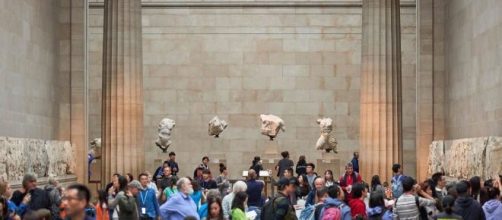Can you believe the cheekiness of the British Museum to offer Greece part-ownership of the Parthenon marbles? How can you share something that isn’t yours?
The marbles – 17 stone figures carved for the 2,500-year-old temple – were ripped from their mooring on the Acropolis in 1816 by the 7th Earl of Elgin and sold to the museum for $50,000.
What’s yours is mine?
Buying stolen property doesn’t make the museum a rightful owner. Clearly shrugging off the theft, deputy director Jonathan Williams told the Sunday Times his offer is intended to “change the temperature of the debate around the marbles.”
Debate?
There’s no debate. The offer to partner is just another in a long list of efforts by the British Museum to keep the marble. The efforts began with Lord Elgin justifying his thievery by saying the museum would be better caretakers of the works than the Greeks.
Not even that claim was true. In 1999, William St. Clair, a British authority on the Parthenon Marbles, told the London Observer of a museum cover-up of foul-ups.
The cover-up
St. Clair said he discovered in a book, the diaries of museum official Roger Hinks how the marbles came to be damaged. As he explained, London’s polluted air ate away at the marble because the museum didn't use proper air-quality filters until 1962.
The museum also damaged the marbles in another way.
In 1938 they bungled a cleaning by using metal scrapers to scrub them to an alabaster white. Then, the museum coated the carvings with wax to mask the damaged surface.
The cleaning was ordered by Lord Duveen of Milbank, the British Museum's benefactor, who, St. Clair said, made his fortune retouching old masters and selling them to gullible Americans. So much for the preservation of the marbles at the museum. Meanwhile, in 2004, the Greeks built a state-of-the-art treasure house for the marbles at the foot of the Acropolis.
Follow the money
But, despite numerous pleas from Greece, the British Museum refuses to return the marbles. It’s not hard to figure out why. The sculptures are said to be the highlight of the institution’s collection.
In plain speak, they are the main draw and big source of revenue. More than six million people reportedly pay $35 a piece to visit the marbles each year.
But wait. There’s more than concern about attendance at play here. Williams let slip a mindless incaution for Greek history saying that the marbles are an “absolutely integral part of the collection.” Hello? What about them being an integral part of the Parthenon?
Last year, a UNESCO advisory committee “recommended” that the Brits re-think their stance. But there was no re-thinking. Art News noted that Prime Minister Boris Johnson told the Greek newspaper Ta Nea that the marbles will never be returned. Never?
The Brits’ exaggerated sense of self-importance, of entitlement, astonishes. Museums are supposed to be living encyclopedias of art history. The British Museum abuses the privilege.


